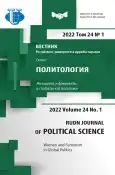Gender Quotas for Political Participation and the Case of Georgia
- Authors: Amiantova I.S.1, Bitsadze N.1
-
Affiliations:
- Peoples’ Friendship University of Russia (RUDN University)
- Issue: Vol 24, No 1 (2022): Women and Feminism in Global Politics
- Pages: 136-147
- Section: REGIONAL COOPERATION AND INTEGRATION
- URL: https://journal-vniispk.ru/2313-1438/article/view/322595
- DOI: https://doi.org/10.22363/2313-1438-2022-24-1-136-147
- ID: 322595
Cite item
Full Text
Abstract
The current study focuses on the key elements limiting the political representation of women in the modern world. In order to eliminate discrimination, some countries introduce gender quotas for political participation. Studying the legal framework of modern Georgia shows that, despite the existing common legal basis for the equality of women and men, the reality in political life is different. The lack of effective quota mechanisms significantly weakens the realization of women’s civil and political rights. Stereotypical attitudes and perceptions about the role of women in society are the main barriers to recruiting in the political and administrative deployment. Considering the gender aspect of political representation as a complex problem necessitated a systematic approach. The historical and comparative method was used to study the evolution of gender equality. A separate group of methods used in the article was made up of the political and legal analysis of empirical database national statistics. The article shows how the Georgian Parliament affects the position of women in politics by introducing mandatory quotas for national and local government elections, increasing the likelihood of women running, being elected and appointed.
Keywords
About the authors
Irina S. Amiantova
Peoples’ Friendship University of Russia (RUDN University)
Author for correspondence.
Email: amiantova_is@rudn.ru
ORCID iD: 0000-0003-1543-0815
PhD, Associate Professor at the Department of Political Analysis and Management
Moscow, Russian FederationNikoloz Bitsadze
Peoples’ Friendship University of Russia (RUDN University)
Email: 1042208033@pfur.ru
ORCID iD: 0000-0001-6567-7184
postgraduate at the Department of Political Analysis and Management
Moscow, Russian FederationReferences
- Ara, F. (2019). Barriers to the political participation of women: A global perspective. Society & Change, 13(4), 7-22.
- Ballington, J. (2014). The Implementation of Quotas: African Experiences Quota Report Series. In J. Ballington (Ed.), International Idea.
- Barnes, T., & Beaulieu, E. (2019). Women politicians, institutions, and perceptions of corruption. Comparative Political Studies, 52(1), 134-167.
- Baturo, A., & Gray, J. (2018). When do family ties matter? The duration of female suffrage and women’s path to high political office. Political Research Quarterly, 71(3), 695-709.
- Belschner, J., & de Paredes, M. (2021). Hierarchies of representation: The re-distributive effects of gender and youth quotas, Representation Journal of Representative Democracy, 57(1), 1-20. http://doi.org/10.1080/00344893.2020.1778510
- Hernes, H. (2018). Women and the welfare state: the transition from private to public dependence. In A.S. Sassoon (Ed.), Women and the State (pp. 77-92). London, Routledge.
- Hessami, Z., & Lopes da Fonseca, M. (2020). Female Political Representation and Substantive Effects on Policies: A Literature Review. IZA - Institute of Labor Economics (IZA DP No. 13125), 4-13.
- Mlambo, C., & Kapingura, F. (2019). Factors influencing women political participation: The case of the SADC region. Cogent Social Sciences, 5(1), 28-41. https://doi.org/10.1080/23311886.2019.1681048
- Profeta, P. (2020). Gender Equality and Public Policy: Measuring Progress in Europe. Cambridge University Press. https://doi.org/10.1017/9781108525886
- Reyes, G. (2001). Four main theories of development: modernization, dependency, word-system, and globalization. Nómadas. Revista Crítica de Ciencias Sociales y Jurídicas, 4(2), 109-124.
- Serpe, L. (2018). Focus Group Findings on Perceptions of Women in Georgian Politics - An Assessment of Perceptions of Women as Political Candidates and Elected Officials. International Foundation for Electoral Systems. Statistics Sweden.
- Shames, S., & Wise, T. (2017). Gender, diversity, and methods in political science: A theory of selection and survival biases. PS: Political Science & Politics, 50(3), 811-823.
Supplementary files









